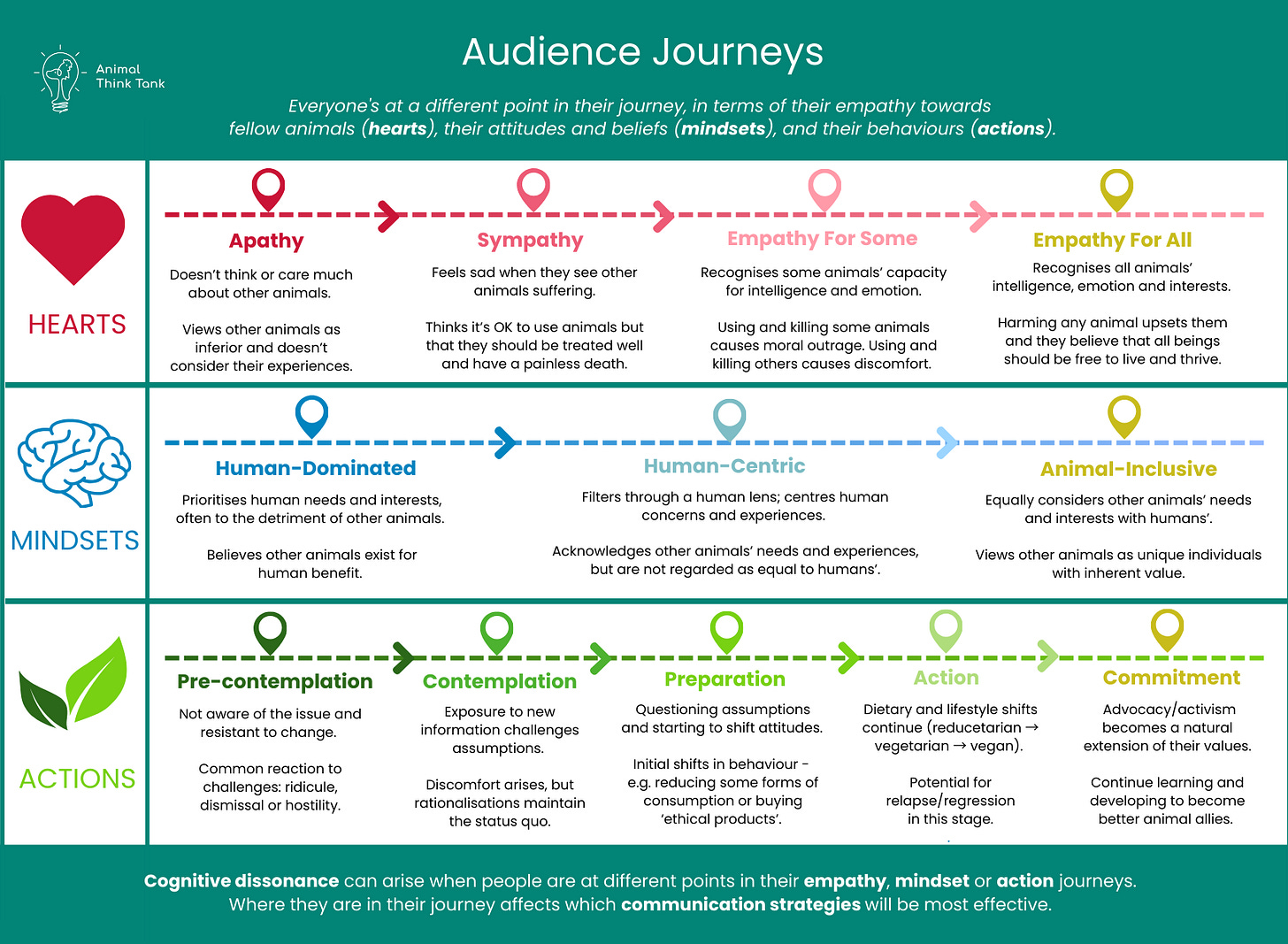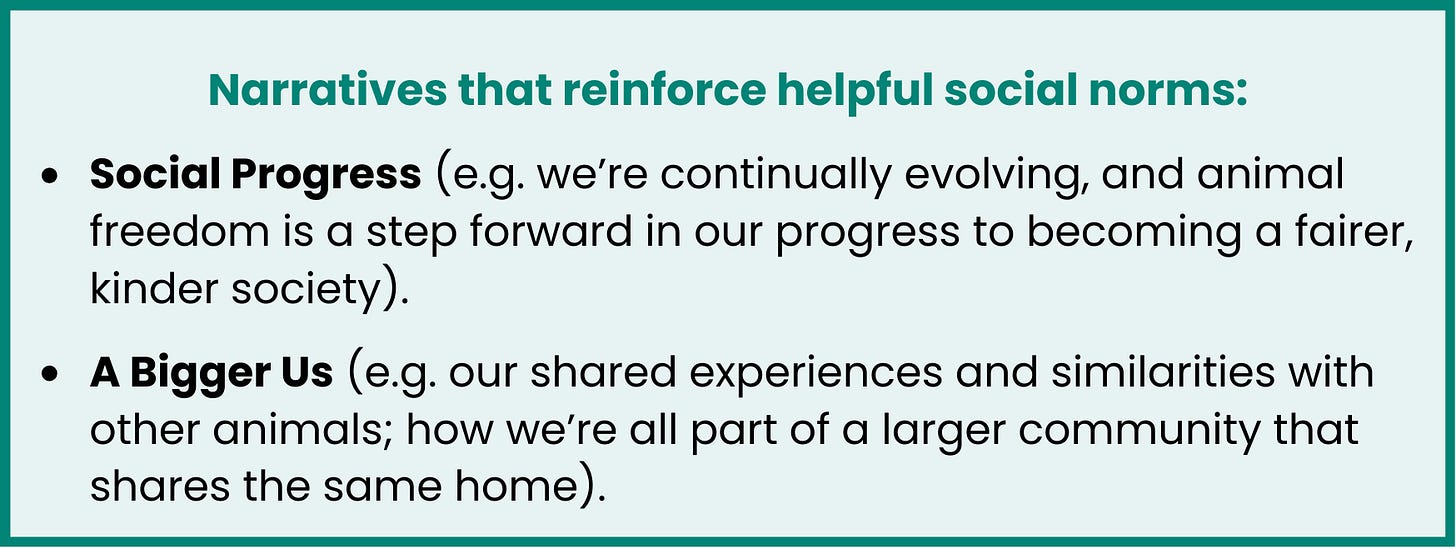Is our messaging meeting the psychological needs of our audiences?
Through focus groups and message-testing, we've found there are three core needs to fulfil for a message to be more persuasive...
The bad news is…
There's never going to be one message, story or narrative that everyone finds persuasive. Even iconic messages from other movements – like 'Love is Love', 'Black Lives Matter' or 'Me Too' – move some people and repel others.
One thing we know for sure at Animal Think Tank, since we began our long-term narrative research project in 2022, is that it's impossible to make blanket statements about what messages will work and what messages won't. Because everyone is unique in terms of what moves them, and everyone is at a different point of their journey...

Take our own movement's dominant message of 'Go vegan'. It might be an effective message for some people (particularly those further along on their journey who might have already been contemplating veganism), who perceive the message as an invitation to boycott violence and act in solidarity with our animal cousins. Yet it's also an ineffective message for many other people, especially those who haven't been thinking about this issue very much (or at all), who perceive the message as a command to do something they may not want to do, and to assume an identity they might not aspire to.
The good news is…
We can learn to engage people who are open to change by better understanding what matters to them. So far, through extensive message-testing and focus groups, we’ve found that there are three core psychological needs that can be met in our audiences in order for our messages to be more effective in moving people forward in their journey – sparking curiosity rather than triggering defensiveness or making them feel villainised.
#1 Our communications need to work with people’s existing mental models
Mental models are our set of personal beliefs about the world we live in. Some of the most relevant mental models are about:
Ourselves/personal identity (e.g. 'I am a good person')
How the world is (e.g. 'animals are intelligent')
How the world ought to be (e.g. our morals: 'killing is bad').
People seek consistency in their understanding of the world (our Communications Toolkit goes into more detail about this). This need for coherence often takes priority over aligning with reality. A person’s beliefs, values and knowledge need to align in a way that feels logical and stable to them.
When new information fits within their existing mental models, it is more likely to be accepted. However, when it contradicts these models and doesn’t align with them, it can trigger reactance and message rejection, as the message isn’t seen as credible or logical.
For example, messages implying that someone is responsible for animal cruelty can clash with someone's mental model of themselves as a 'good' person – particularly people further back in their journey. When people see themselves as caring individuals – perhaps as animal lovers or ethical consumers buying ‘high welfare’ products – such messages can trigger defensiveness and rejection of the message because their self-image as a good person is being challenged.
The need to feel like a good person is so powerful and fundamental in humans that any kind of threat to that belief can result in feelings of shame being projected on to the messenger (i.e. I’m not a bad person, you are…). Ever wondered where the ‘militant vegan’ stereotype came from? People who aren’t yet vegan don’t want to feel villainised, so they defensively project those feelings on to the messenger, framing them as the villain instead. The result? A message that was supposed to make people think only makes them shut down instead…

Messages that encourage people to support an issue or take action, by highlighting that this aligns with values or identities they already hold, are more likely to fit with their existing mental model of their identity and therefore are more likely to be accepted.

#2 People need to feel like they’ve reached their own conclusions
Agency is the fundamental need to feel in control of our own actions and decisions. When communication styles threaten people’s sense of agency, it can cause rejection of a message, defensiveness, or even anger towards the messenger. (Again, this can result in audiences framing the messenger as a ‘militant vegan’…)
#3 People need to feel a sense of belonging
Belonging is the need to feel accepted and connected within a group or community. Because of this, people will 'follow the crowd'. This is known as social proof, where people are more likely to support a cause or take action if they see others doing so. Highlighting growing public support for animal freedom and movement wins can tap into the power of social proof. Likewise, if people see plant-based eating becoming the dominant norm, they will more likely adopt it in order to remain in the ‘in-group’.

If you’re interested in finding out more ways we can tailor our communications to different audiences, check out the first edition in our new mini guides series – Understanding Our Audiences:









The working with existing mental models definitely explains why many people shut down if I make a leap too big. Will work on framing things that align with where they're at. Thank you!
Very well articulated. I agree with this approach !